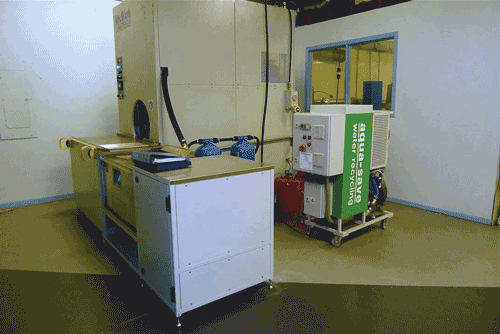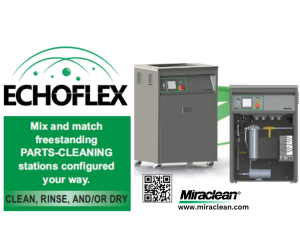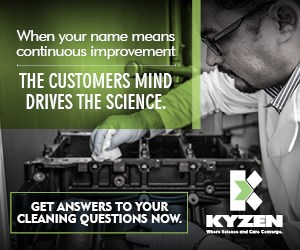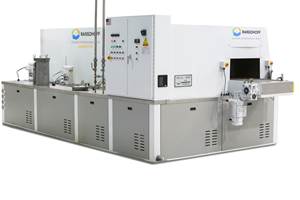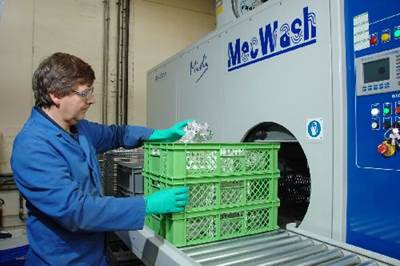Aqueous System Helps Clean Up the Process
With the right cleaning system, this company was able to reduce failure rate and rework costs while refining its production process.
In addition to reductions in failure rate and rework costs, the right cleaning system can help a company refine its production process to manufacture quality products efficiently. That’s exactly what Kinemotive Corporation (Farmingdale, N.Y.) accomplished as it achieved significant operational savings, including improvements in lost labor hours and scrap rates, after installing a MecWash AVD aqueous cleaning system. The company also now saves thousands of dollars per year in solvent costs that it was putting toward operation of the previous vapor degreasing system.
Background
Kinemotive Corporation manufactures temperature sensors, pressure switches, fluid control valves, thermal actuators, vibration dampeners, and edge-welded bellows for the aerospace, defense, medical, industrial and semiconductor industries. These products are critical to the fail-safe operation of the equipment on which they are installed for companies such as GE, Honeywell, Boeing, UTC Aerospace, Lockheed Martin, Silicon Valley Group, Varian Semiconductor and others.
Before its purchase of the MecWash AVD, Kinemotive cleaned parts prior to assembly using a vapor degreaser. While this system was effective for many parts, it did not effectively clean those that were machined upstream using water-based lubricants and coolants. This problem was particularly acute in the process of micro-welding bellows sensors.
Bellows sensors are manufactured from chill rings—metal rings that can be as thin as a human hair. The chill rings must be absolutely free of contamination prior to being micro-welded or the encapsulated contamination will cause the weld to fail. If a single micro-weld fails, the entire bellows sensor is rejected. Some of Kinemotive’s bellows sensors are complex, containing thousands of micro-welds. A micro-weld that fails during the assembly of a bellows of this design can easily cost the company thousands of dollars in lost labor and the scrapping of chill rings.
The vapor degreaser did not consistently clean the chill rings to the degree of cleanliness required. The company searched for a solution for several years before Executive V.P. and General Manager Chuck Szeglin contacted MecWash Systems. “We ran cleaning trials with a number of wash equipment companies, but none of their systems performed consistently better than our vapor degreaser. That is, until we started working with MecWash.”
System Meets Needs
After three rounds of cleaning trials, Kinemotive ordered the MecWash AVD, a high-temperature, ultrasonic, vacuum dry, aqueous vapor degreaser. When paired with MecWash System’s cleaning chemical AC-32, this aqueous cleaning system can remove almost any contamination Kinemotive encounters, whether it is water- or mineral-based.
Although Kinemotive still has its original vapor degreaser, they do not use it often. “Since we installed the MecWash system, we use the vapor degreaser to clean only a small subset of our parts,” Mr. Szeglin says. “This has allowed us to drastically reduce our solvent purchases, which has saved us a lot of money.”
Because Kinemotive requires such demanding cleanliness standards for its components, the configuration of the MecWash equipment installed at the company is a bit unusual. The company tests bellows sensors for functionality in silicone oil at high heat. Afterward, these components are taken to the cleaning system. Silicone oil is a tenacious oil to clean from metal surfaces. After this sensor testing, silicone oil becomes deeply embedded into the bellows, making the component difficult to clean. MecWash Systems devised a process whereby these bellows sensors are first cleaned in an ultrasonic dunk tank built into the framework of the AVD that contains 100-percent AC-32 chemical at 140°F. After the sensors are exposed to this ultrasonic bath, they are then moved to the wash chamber to be cleaned using ultrasonic wash and rinse, flood wash and rinse, and spray wash and rinse cycles. The cleaning process concludes with a 285°F hot air blow dry and a deep-drawn vacuum dry to ensure that all moisture is pulled out of the now-contracted chill rings of the bellows.
Another special requirement of this system is that the rinse tank water must be absolutely pure at all times, with no contamination at all. To achieve this requirement, MecWash installed its water polishing circuit. This polishing circuit purifies the entire quantity of water in the rinse tank in 15 minutes—less than the time needed to run one complete cleaning cycle. The polishing circuit is also fitted with an alarm to let the operator know when it is time to change the polishing cylinders.
Quick Payback
In the 12 months before installing the MecWash system, Kinemotive spent almost $50,000 on cleaning solvent. In the first year after installing the system, the company trimmed that number to less than $15,000—a savings of $35,000 over the preceding year in purchased solvent. For the new system, the company purchased $4,260 of MecWash AC-32 aqueous cleaning chemical in that year. Thus, Kinemotive’s net savings on money spent for cleaning chemicals in the first year was more than $30,000.
Additionally, the failure rate of chill ring micro-welds in the assembly of bellows sensors has effectively been reduced to zero, saving the company thousands of dollars in lost labor and scrapped materials. And handling items only once allows the company to operate far more efficiently.
“We’re pleased that Kinemotive has entrusted MecWash with its parts washing needs,” says Bill Westbrook, North American operations manager for MecWash Systems. “Its experience shows first-hand the far-reaching aspects that cleanliness can have for manufacturers in demanding applications. Replacing vapor degreasing solvents with aqueous chemicals saves the company a significant amount of money. Eliminating re-work and scrap is also beneficial. We’re thrilled to provide a cleaning solution that meets Kinemotive’s rigorous cleanliness requirements and that also saves money and operates more efficiently.”
Related Content
PMTS 2023 Product Preview: Parts Cleaning
Learn about some of the latest parts cleaning solutions that will be on display at PMTS 2023.
Read MoreIn-line Monitoring for Automated Immersion Cleaning Systems
Ecoclean’s Acoustic Performance Measurement (APM) system provides in-line measurement of ultrasonic frequency and power in fully automated immersion cleaning systems on a batch-by-batch basis or at defined time intervals, such as once a shift, day or week.
Read MoreMeeting Stringent Cleaning Goals With Modular Ultrasonic System
A knee implant manufacturer implements an advanced cleaning system that meets its tight cleaning requirements, including documenting, validating and tracing the entire cleaning process.
Read MoreSita’s CleanoSpector Measures Part Cleanliness
PMTS 2023: Handheld measuring device checks for cleanliness of parts to assure product quality as well as prior to follow-up processes.
Read MoreRead Next
Parts Washer Designed for Aerospace
MecWash Systems’ Midi fully automatic, self-contained aqueous cleaning system is designed to meet the cleanliness and inspection standards required by aerospace applications.
Read MoreDo You Have Single Points of Failure?
Plans need to be in place before a catastrophic event occurs.
Read MoreA Tooling Workshop Worth a Visit
Marubeni Citizen-Cincom’s tooling and accessory workshop offers a chance to learn more about ancillary devices that can boost machining efficiency and capability.
Read More


